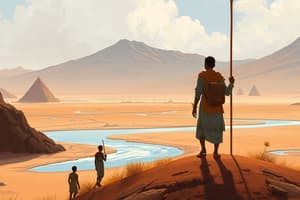Podcast
Questions and Answers
How old was Nya in the beginning of the book?
How old was Nya in the beginning of the book?
11
What was the official language of the Sudanese government?
What was the official language of the Sudanese government?
Arabic language
What language did Salva speak at home?
What language did Salva speak at home?
Salva spoke the language of his Dinka tribe.
How old was Salva when war came to his village?
How old was Salva when war came to his village?
Why didn't Salva attend school all year?
Why didn't Salva attend school all year?
How far was the school from his home?
How far was the school from his home?
What did Salva's father do?
What did Salva's father do?
When did boys in Salva's village start to go to school?
When did boys in Salva's village start to go to school?
What did Salva's mother give him to keep his belly full until suppertime?
What did Salva's mother give him to keep his belly full until suppertime?
Who was fighting the war in Sudan?
Who was fighting the war in Sudan?
Why were the rebels fighting against the government?
Why were the rebels fighting against the government?
During her trips to get water, what did Nya have to worry about?
During her trips to get water, what did Nya have to worry about?
What was the name of the village Salva was from?
What was the name of the village Salva was from?
Salva's village was named after which of his family members?
Salva's village was named after which of his family members?
What happened in the morning after Salva slept in the barn?
What happened in the morning after Salva slept in the barn?
What did Nya put on her head to help carry the container of water?
What did Nya put on her head to help carry the container of water?
What did Salva call the old woman who lived in the house?
What did Salva call the old woman who lived in the house?
What did the old woman give Salva to eat?
What did the old woman give Salva to eat?
Why couldn't Salva go with the old woman when she left?
Why couldn't Salva go with the old woman when she left?
What was the Dinka pattern that was a sign of boys becoming men?
What was the Dinka pattern that was a sign of boys becoming men?
What did Nya's mother give her to eat after she got water?
What did Nya's mother give her to eat after she got water?
How old was Nya's younger sister Akeer?
How old was Nya's younger sister Akeer?
Why did Nya's mother want her to take Akeer with her to collect water?
Why did Nya's mother want her to take Akeer with her to collect water?
How many trips did Nya make to the pond for water each day?
How many trips did Nya make to the pond for water each day?
What did the old woman give Salva when he left with the other Dinka?
What did the old woman give Salva when he left with the other Dinka?
What did Buksa, a young man from the Jur-chol tribe, find?
What did Buksa, a young man from the Jur-chol tribe, find?
How far was the big lake from Nya's village?
How far was the big lake from Nya's village?
How long did Nya's family live at the big lake?
How long did Nya's family live at the big lake?
Who did Salva meet while searching the camp for his family?
Who did Salva meet while searching the camp for his family?
Where did Marial tell Salva they were going?
Where did Marial tell Salva they were going?
In the Dinka language, what were the Atuot people called?
In the Dinka language, what were the Atuot people called?
What did Nya like about the lake camp?
What did Nya like about the lake camp?
What did Nya's mother hate about the lake camp?
What did Nya's mother hate about the lake camp?
Which family member did Salva find first?
Which family member did Salva find first?
Why had Salva not seen his uncle for two years?
Why had Salva not seen his uncle for two years?
Flashcards are hidden until you start studying
Study Notes
Nya's and Salva's Background
- Nya started the story at 11 years old, illustrating the challenges of childhood in conflict zones.
- The official language of the Sudanese government was Arabic, reflecting colonial influence and diversity in the region.
Salva's Early Life
- Salva spoke Dinka, the language of his tribe, at home, highlighting his cultural identity.
- He was 11 when war disrupted his village, indicating how young lives are affected by conflict.
- School was not attended year-round due to his family’s seasonal relocation for water access.
- School was located only a half-hour walk from Salva's home, emphasizing the accessibility of education pre-war.
Family and Community
- Salva's father served as a judge in the village, indicating a position of respect and authority.
- Boys typically began school at around 10 years old, showing early educational engagement in the community.
Daily Life and Struggles
- Salva's mother gave him a bowl of fresh milk after school, symbolizing familial care.
- The conflict involved rebels from southern Sudan fighting against a government based in the north, framing the historical backdrop of the war.
- Rebels fought to maintain religious diversity, opposed to forced Islamic practices by the northern government.
Nya's Water Collection
- Nya faced dangers like heat and thorns while collecting water, illustrating harsh living conditions.
- Her village was named Loun-Ariik, linking her identity to a specific community.
- The village's name commemorated Salva's grandfather, showcasing family legacy.
Displacement and Survival
- Salva’s group left him behind, emphasizing the chaos of fleeing conflict.
- Nya used a cloth "doughnut" to assist with carrying water, highlighting resourcefulness in daily tasks.
- An old woman, referred to as "Auntie" by Salva, provided kindness and sustenance, showcasing community support amidst hardship.
Cultural Practices
- Dinka men bore V-shaped scars on their foreheads, a rite of passage signifying maturity in their culture.
- Nya’s mother fed her a bowl of boiled sorghum meal with milk, providing details of their diet.
Family Responsibilities
- Nya's younger sister Akeer was 5, showing the family dynamic and the responsibilities placed on older siblings.
- Nya had to learn to fetch water effectively, portraying the transition to adulthood in challenging circumstances.
- She made two daily trips to the pond for water, stressing the routine demands of her life.
Survival and Generosity
- Salva received a bag of peanuts and a gourd for water from the old woman upon leaving, illustrating acts of kindness in dire conditions.
- Buksa discovered a beehive, highlighting the potential for food and resource acquisition in the environment.
Geographic and Temporal Context
- The big lake was a three-day walk from Nya’s village, showing the extent of their geographical challenges.
- Nya's family resided at the big lake for five months during the dry season, reflecting migration patterns due to water scarcity.
Relationships and Hope
- Salva met Marial while searching for family, demonstrating the importance of companionship during hardship.
- Marial indicated they were headed to Ethiopia, portraying a potential hope for safety and refuge.
- In Dinka, the Atuot people were referred to as "the people of the lion," indicating cultural identities within South Sudan.
Reflections on Living Conditions
- Nya appreciated the lake camp for reducing her water-fetching trips, yet her mother despised the makeshift living conditions and lack of belongings due to the threat of conflict.
- Salva’s reunion with Uncle Jewiir, his father’s younger brother, signifies family ties amidst chaos and loss.
Military Impact
- Salva's uncle had been in the army, indicating military involvement and the impact of conflict on familial relationships.
Studying That Suits You
Use AI to generate personalized quizzes and flashcards to suit your learning preferences.




